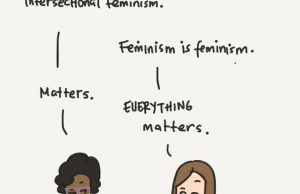Can I Live?
By Analena Hope
“Can I live?” This simple yet resounding question has been posed a number of times in different ways by Black feminists within and outside of the academy, and quite often the answer is: no, not without a fight and an intentional will to be well.
If the academy is a body, then we, the academics, are the blood being pushed through the arteries: the higher the pressure, the more difficult the journey through. This is surely true for all academics in a system where the “heart” forces us through at accelerating rates, demanding always increasing levels of productivity, but Black women often find ourselves struggling to emerge from disproportionately clogged arteries that have been narrowed and hardened by generations of institutionalized racism and sexism. Those of us who do get through do not emerge unscathed from what can be described as an assault on Black women’s bodies and psyches. We creatively hustle to find niches and pathways for ourselves that temporarily protect us from individual attacks, but our traumas are not isolated incidents. The cost of war is always collective. At any given moment, that colleague who has fallen ill after struggling through a traumatic or abusive experience could easily be us – suffering silently and in isolation, equating our apparent “failures” in the academy with our inherent self worth, internalizing the poison of a broken system and becoming alienated from one another.
When the world in which we live is toxic, how can we be well? Physician and author Gabor Maté argues that questions of disproportionate illness are intrinsically more social than biological or genetic, and that we must begin to address the ways that the impacts of a toxic society are borne upon our bodies and psyches. At present, our physical environment is filled with chemicals: our food, water, air and soil as well as the products we use on our bodies and the fluorescent buildings that we live and work in are all contaminated and in turn contaminate us. Similarly, the academic social spaces where we think and produce knowledge can generate stressors with the same corporeal manifestations as exposure to material hazards. For instance, perhaps we develop a cough, a lump, chronic headaches or fatigue, or the all-too-common academic feelings of insecurity, isolation, inadequacy and depression. A study by Vakalahi and Starks (2011) on the biological and psychological well-being of women of color academics found that illnesses such as hypertension, diabetes, depression (and I would add various cancers) were significantly exacerbated by racism and sexism in the workplace, and a lack of free time to eat well and perform adequate self-care. Survival is a battle, both within and outside of the academy, and wellness is often another story altogether.
I imagine that many of us entered the academy with intentions to address and somehow rectify the legacies of oppression plaguing our communities, and in doing so we have ironically become susceptible to the same precarious conditions we wish to amend. My own work around food and health was born from my startling recognition of a terrifying new normal in which pain, disease, poor health, and premature death have become standard features of Black life. It is no secret that Black people suffer disproportionately from terminal illnesses and die earlier and more often than other groups, but the social and structural factors that shape these disparities are often overlooked in favor of victim-blame narratives and cultural deficiency models. The excessively stressful experience of Black women in the academy has also been dangerously normalized while the structural underpinnings of the institution stay the same. In a 2003 talk at Harvard University, author Deborah Gray White discusses the feelings of stress, alienation and isolation that persist among overworked Black women whose intellectual contributions remain at the margins of historically inequitable academic institutions. White points out that despite efforts to diversify and retain faculty of color, the deep-rooted traumas of racism and sexism and the resulting negative health outcomes are continually reproduced and persist as central components of the academic experience.
The university is but one institution of many in a society that is inhospitable to Black women and indifferent to our health and survival. Knowing this, we can expect and even brace ourselves against the distress and dis-ease that the academy produces. It is the reproduction of our abuses, however, that causes the deepest injury. Our traumas are often subconsciously replicated, even by those of us who entered the academy with explicit intentions not to do so. How can we enact the revolutionary framework and practices of love that our Black feminist genius predecessors write about? What would it take for us to collectively divest from the reproduction of the very elements that contribute to the far-too-early deaths of far too many of us?
Breaking these cycles of abuse begins with an intentional self-care practice, and a recognition that we, too, deserve to thrive and be well. Many of us who fight on behalf of oppressed people tend to think that if we do not martyr ourselves in the process of liberation, then we are not doing it right. We end up struggling for struggle’s sake, feeling guilty and selfish if we ever take a moment to sit back and enjoy the fruits of our labor because stress and tension are in many ways more comfortable than leisure and pleasure. Someone once asked me what I would do if there were nothing left to fight for. In other words, if we suddenly found ourselves living in the world of our dreams, how would I spend my time and energy? Taken aback, I finally said that I’d probably dance more, and paint, spend time with my loved ones, and write more poetry. But I can’t wait for the revolution to begin taking care of myself. It is imperative that I make space for these things now, because it is clear that the seeds of justice and freedom that I am planting will not likely come to fruition in my lifetime. My battle for health and survival in the communities to which I am accountable must begin with me, and my intrinsic right to live happily, healthfully, and joyfully in the present moment. As I often remind my own self-sacrificing mother, you are like a tree that sustains many different life forms and ecosystems. If you go down, everyone who depends on you will suffer. Therefore, it is in everyone’s best interest that you are well.
Community-engaged care in the academy looks like accountable and self-reflexive mentorship. It looks like a collective effort to resuscitate when one of us is debilitated physically, emotionally or spiritually. It’s about resisting and intervening in those institutional processes that are bigger and older than we are, and which threaten our existence and survival within academic spaces and in the world at large. Our task is to re-member the power and significance of our words; like when Audre told us that we weren’t meant to survive (and yet here we are), or when June reminded us that we are the ones we have been waiting for. It’s up to us to shift the ways that we care for each other and ourselves within institutions that are designed to exploit our contributions and use our bodies to fill their diversity quotas. We must work to create a new paradigm of “normal” that is rooted in vitality instead of stress if we are to make it through the academy and live to tell our stories. We must apply our liberation theories to our own real lives and relationships if we are to create routes within these broken systems to make the journey less deadly for those who walk the path after us.
Works Referenced:
White, D. (2003). “Black Women’s Academic Experience”. Gender and Race: Together At Last? Conference at Harvard University.
Maté, G. (2004). When the Body Says No: The Cost of Hidden Stress. Random House Digital, Inc.
Vakalahi, H., Starks, S. (2011). “Health, Well-being and Women of Color Academics”. International Journal of Humanities and Social Science. Vol. 1 No. 2.
_________________________________________
 Analena Hope is a fourth-year PhD candidate at the University of Southern California in the Department of American Studies and Ethnicity. Her research explores health through the lens of food, focusing specifically on ways to contend with structural inequalities within global food systems and a medical industrial complex that profits from poor health and food-related illnesses. Analena investigates and complicates notions of food justice, food access and food sovereignty, situating food as central to the transformation of communities of color.
Analena Hope is a fourth-year PhD candidate at the University of Southern California in the Department of American Studies and Ethnicity. Her research explores health through the lens of food, focusing specifically on ways to contend with structural inequalities within global food systems and a medical industrial complex that profits from poor health and food-related illnesses. Analena investigates and complicates notions of food justice, food access and food sovereignty, situating food as central to the transformation of communities of color.




28 Comments